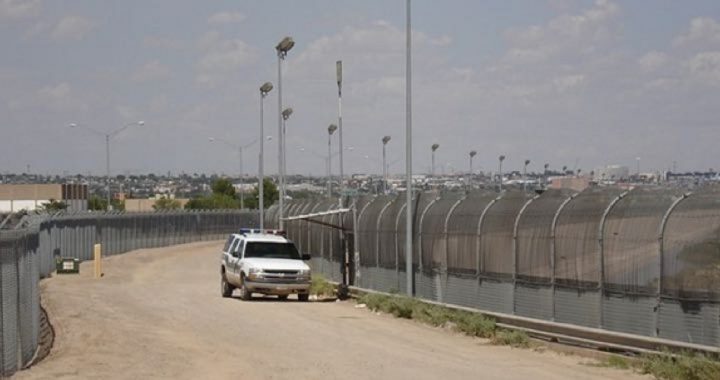
Republicans and Democrats in the Senate joined together to pass a $854 billion spending bill that includes funding for all sorts of federal programs, but President Trump insists that despite its size, the budget still comes up a little short.
“I want to know, where is the money for Border Security and the WALL in this ridiculous Spending Bill, and where will it come from after the Midterms? Dems are obstructing Law Enforcement and Border Security. REPUBLICANS MUST FINALLY GET TOUGH!” the president tweeted in the pre-dawn hours Thursday.
While he does call the spending bill “ridiculous,” that adjective seems earned by the budget not because of the billions wasted on unconstitutional programs, but on the failure to fund the president’s pet project: a wall along the southern border of the United States.
In what can only be considered by the millions of their party members around the country a betrayal of trust, only six Republicans — Jeff Flake (Ariz.), Mike Lee (Utah), Rand Paul (Ky.), David Perdue (Ga.), Ben Sasse (Neb.), and Pat Toomey (Pa.) — voted against the spending package.
Consider the praise of the package given by Senate Majority Leader Mitch McConnell (Ky.): “These milestones may sound like inside baseball, but what they signify is a Senate that is getting its appropriations process back on track, a Senate that is attending to vital priorities for our country,” McConnell said.
Well, that’s a relief.
What isn’t a vital priority for these “Republican” senators is upholding the oath every single one of them took to remain faithful to the Constitution.
Why, one might ask, is it so important for elected federal officials to stay inside the four corners of the Constitution? Why can’t they just enact whatever law they consider “vital?”
In his book Discourses Concerning Government (a book praised by Thomas Jefferson as “probably the best elementary book of the principles of government, as founded in natural right, which has ever been published in any language”) the incomparable Algernon Sidney explained that a lawmaker “can have no will but as the law directs. If he [the lawmaker] depart from the law, he is no longer [a lawmaker], and his will is nothing to us.”
Fair enough, but why is their will nothing if they go beyond the boundaries set by the law?
Thomas Jefferson, again, explained the reason very succinctly in the Declaration of Independence: “That to secure these rights, Governments are instituted among Men, deriving their just powers from the consent of the governed.”
In the United States, the consent of the governed is expressed within the “few and defined” powers enumerated in the Constitution. The federal government has no authority whatsoever to legislate in any area not within those boundaries.
Using his communication outlet of choice, President Trump tweeted in August how far he was willing to go to get his wall built on the border: “I don’t care what the political ramifications are, our immigration laws and border security have been a complete and total disaster for decades, and there is no way that the Democrats will allow it to be fixed without a Government Shutdown. A Government Shutdown is a very small price to pay for a safe and Prosperous America!”
A couple of weeks later, however, the president told Fox News that he “most likely” would not shut down the government if Congress did not pay to start laying bricks on the border with Mexico.
Mind you, it was only weeks ago during a White House meeting with FIFA President Gianni Infantino that President Trump told reporters, “The wall will be paid for very easily, by Mexico. It will ultimately be paid for by Mexico.”
The bottom line is that the president is a Wharton grad and he can do the math: His fellow Republicans all but unanimously approved a bill that didn’t fund his wall, but did shovel plenty of money onto the dumpster fire that is federal student loans!
That’s not the type of party-line loyalty the president needs if he’s going to “put up that wall,” to paraphrase a predecessor.
According to the New York Times in April 2017, a report “said the border wall could cost nearly $70 billion to build and $150 million a year to maintain. An internal report by the Department of Homeland Security said the wall could cost about $21.6 billion, not including maintenance.”
Here’s a good question for the GOP: Given that the bill approved by the Senate included $24,445,352,000 in federal financial aid for students and the Department of Homeland Security report cited above estimates that the president’s wall would cost about $3 billion less than that, will Republican leaders in the Senate and House take the student loan money — something the rank and file have called for for decades — and put it toward building the wall?
That’s quite a conundrum when you think about it. Where will lawmakers’ loyalties ultimately lie: their constitutional oath of office, the president, or the unconstitutional funding of federal student aid?
At the end of the day, it might not matter. The Hill recently reported that President Trump said he “intends [to] take an executive action on immigration in the coming weeks, though he declined to specify what it might be.”
I’ll close by returning to the writings of Algernon Sidney, who wrote that if a lawmaker acts outside the scope of the authority granted him by the people, then the people “may safely deny them to be laws, or in any sense to have the effect of laws.”
Photo: U.S. Congress



